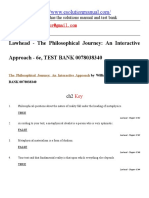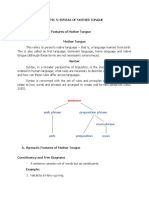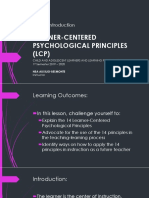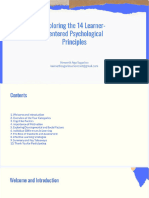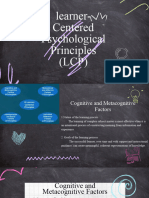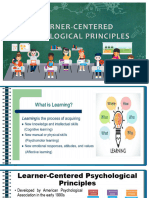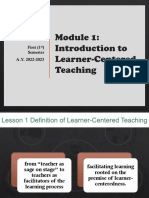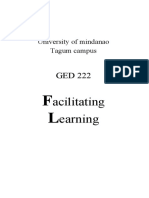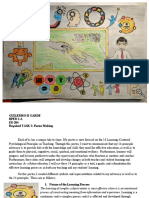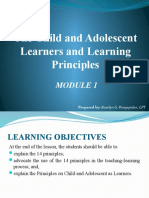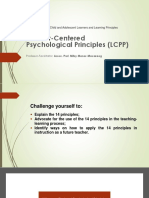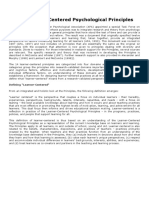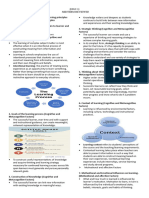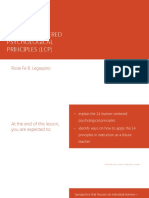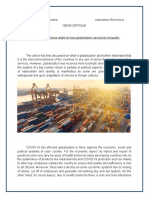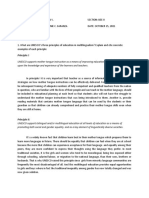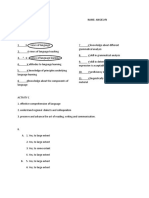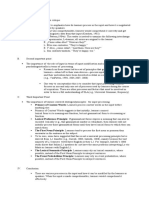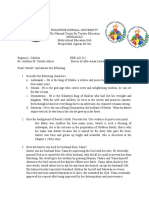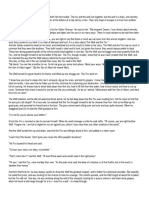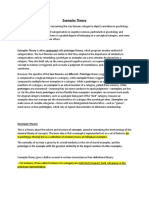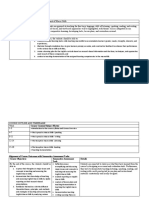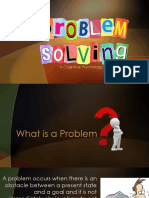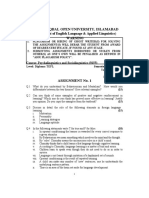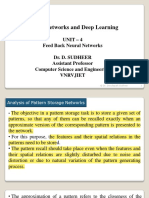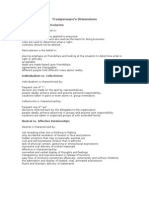0 ratings0% found this document useful (0 votes)
75 viewsMam Rose
Mam Rose
Uploaded by
Angielyn Montibon JesusThe document outlines 14 principles of how learning works based on cognitive, motivational, developmental, social, and individual difference factors. It discusses how learning is most effective when it is an intentional process where learners can construct meaning, link new information to existing knowledge, and use thinking strategies. Motivation and social interactions also influence learning. Learning works best when tailored to a learner's development level, backgrounds, and abilities. Standards and assessments are important for monitoring learning progress.
Copyright:
© All Rights Reserved
Available Formats
Download as DOCX, PDF, TXT or read online from Scribd
Mam Rose
Mam Rose
Uploaded by
Angielyn Montibon Jesus0 ratings0% found this document useful (0 votes)
75 views2 pagesThe document outlines 14 principles of how learning works based on cognitive, motivational, developmental, social, and individual difference factors. It discusses how learning is most effective when it is an intentional process where learners can construct meaning, link new information to existing knowledge, and use thinking strategies. Motivation and social interactions also influence learning. Learning works best when tailored to a learner's development level, backgrounds, and abilities. Standards and assessments are important for monitoring learning progress.
Original Title
mam rose
Copyright
© © All Rights Reserved
Available Formats
DOCX, PDF, TXT or read online from Scribd
Share this document
Did you find this document useful?
Is this content inappropriate?
The document outlines 14 principles of how learning works based on cognitive, motivational, developmental, social, and individual difference factors. It discusses how learning is most effective when it is an intentional process where learners can construct meaning, link new information to existing knowledge, and use thinking strategies. Motivation and social interactions also influence learning. Learning works best when tailored to a learner's development level, backgrounds, and abilities. Standards and assessments are important for monitoring learning progress.
Copyright:
© All Rights Reserved
Available Formats
Download as DOCX, PDF, TXT or read online from Scribd
Download as docx, pdf, or txt
0 ratings0% found this document useful (0 votes)
75 views2 pagesMam Rose
Mam Rose
Uploaded by
Angielyn Montibon JesusThe document outlines 14 principles of how learning works based on cognitive, motivational, developmental, social, and individual difference factors. It discusses how learning is most effective when it is an intentional process where learners can construct meaning, link new information to existing knowledge, and use thinking strategies. Motivation and social interactions also influence learning. Learning works best when tailored to a learner's development level, backgrounds, and abilities. Standards and assessments are important for monitoring learning progress.
Copyright:
© All Rights Reserved
Available Formats
Download as DOCX, PDF, TXT or read online from Scribd
Download as docx, pdf, or txt
You are on page 1of 2
The 14 principles Topics/ specific My learnings/ insights on how will I
concepts from module apply what I learned
1-25
Cognitive and Metacognitive factors
1. Nature of the learning process.
The learning of complex subject matter
is most effective when it is an intentional
process of constructing meaning from
information and experience.
2. The goals of the learning process.
The successful learner, over time and
with support and instructional guidance,
can create meaningful, coherent
representations of knowledge.
3. Construction of knowledge.
The successful learner can link new
information with existing knowledge in
meaningful ways.
4. Strategic thinking.
The successful learner can create and
use a repertoire of thinking and
reasoning strategies to achieve complex
learning goals.
5. Thinking about thinking
Higher order-strategies for selecting and
monitoring mental operations facilitate
creative and critical thinking.
6. Context of learning.
Learning is influenced by environmental
factors, including culture, technology ,
and institutional practices.
Motivational and affective factors
7. Motivational and emotional influences
on learning
What and how much is learned is
influenced by the learner’s motivation.
Motivation to learn, in turn is influenced
by the individuals emotional states,
beliefs, interests and goals and habits of
thinking.
8. Intrinsic motivation to learn.
The learner’s creativity, higher order
thinking, and natural curiosity all
contribute motivation to learn. Intrinsic
motivation is simulated by tasks of
optimal novelty and difficulty, relevant to
personal interests, and providing
personal choice and control,
9. Effects of motivation on effort.
Acquisition of complex knowledge and
skills requires extended learner’s effort
and guided practice. Without learner’s
motivation to learn , the willingness to
exert this effort is unlikely without
coercion
Developmental and social factors
10. Developmental influences on learning
As individuals develop, there are
different opportunities and constraints
for learning. Learning is most effective
when differential development within
and across physical, intellectual,
emotional, and social domains is taken
into account.
11. Social influences on learning.
Learning is influenced by social
interactions, interpersonal relations, and
communication with others.
Individual differences factors
12. Individual differences in learning.
Learners have different strategies ,
approaches, and capabilities for
learning that are prior experience and
heredity.
13. Learning and diversity.
Learning is most effective when
differences in learner’s linguistic,
cultural, and social backgrounds are
taken into account.
14. Standards and assessment .
Setting appropriately high and
challenging standards and assessing
the learner as well as learning progress-
including diagnostic process, and
outcome assessment – are integral
parts of the learning process.
You might also like
- The Philosophical Journey: An Interactive Approach by William Lawhead - 6e, TEST BANK 0078038340Document20 pagesThe Philosophical Journey: An Interactive Approach by William Lawhead - 6e, TEST BANK 0078038340jksmtnNo ratings yet
- Topic 5: Syntax of Mother Tongue: Verb Phrase Preposition PhraseDocument5 pagesTopic 5: Syntax of Mother Tongue: Verb Phrase Preposition PhraseShaira Calibuso Talisic100% (1)
- CHAPTER 1 - The Linguistic Components of C.ADocument41 pagesCHAPTER 1 - The Linguistic Components of C.ANguyễn DươngNo ratings yet
- 14 Learner-Centered: Psychological PrinciplesDocument19 pages14 Learner-Centered: Psychological PrinciplesLysander Garcia100% (3)
- Learner-Centered Psychological Principles Lesson 1Document26 pagesLearner-Centered Psychological Principles Lesson 1Trixie Mae Issobelle Remoroza100% (3)
- 1 The Child and Adolescent Learners and Learning Principles 1Document8 pages1 The Child and Adolescent Learners and Learning Principles 1Arianne Rose FangonNo ratings yet
- Learner: Motivational and Affective Factors (3 Principles) Cognitive and Metacognitive Factor (6 Principles)Document3 pagesLearner: Motivational and Affective Factors (3 Principles) Cognitive and Metacognitive Factor (6 Principles)Sherwin Gipit100% (3)
- Revisiting the-WPS OfficeDocument22 pagesRevisiting the-WPS OfficeJa Sarmiento75% (4)
- Prof Ed 1 Lecture 1 Learner Centered PrinciplesDocument65 pagesProf Ed 1 Lecture 1 Learner Centered PrinciplesDee Em87% (52)
- Lesson 2 2Document17 pagesLesson 2 2dungogteofilo937No ratings yet
- Unit 1Document21 pagesUnit 1Jinzel Kaye CristobalNo ratings yet
- 14 Psychological Principles Are Divided IntoDocument2 pages14 Psychological Principles Are Divided IntoNorlijun V. HilutinNo ratings yet
- 14 Learning Principles: - Erica Miles BarrientosDocument6 pages14 Learning Principles: - Erica Miles BarrientosERICAMILES BARRIENTOSNo ratings yet
- Facilitating Learner - Centered TeachingDocument21 pagesFacilitating Learner - Centered TeachingRicamae BalmesNo ratings yet
- 1 Unit I Child and Adolescent Learners and Learning PrinciplesDocument23 pages1 Unit I Child and Adolescent Learners and Learning PrinciplesDumbbledoreNo ratings yet
- Learner-Centered Psychological PrinciplesDocument16 pagesLearner-Centered Psychological Principlesdimple tanNo ratings yet
- Learner-Centered Psychological Principles (LCP) : Ma'Am Yen CeledonDocument9 pagesLearner-Centered Psychological Principles (LCP) : Ma'Am Yen CeledonDan Jezreel EsguerraNo ratings yet
- Module 1Document5 pagesModule 1Dhaze OjanoNo ratings yet
- Learner - Centered Psychological Principles: Reporter: Gerardo M. Altamia Jr. CherylDocument17 pagesLearner - Centered Psychological Principles: Reporter: Gerardo M. Altamia Jr. CherylZtik PeraltaNo ratings yet
- Cog, Meta and 14Document3 pagesCog, Meta and 14alexisespiritu30No ratings yet
- Les 1 Learner Centered Psychological PrinciplesDocument17 pagesLes 1 Learner Centered Psychological Principleslizelejoyvillanueva8No ratings yet
- LESSON II-Principle Learner-CenteredDocument3 pagesLESSON II-Principle Learner-CenteredCharmaine Joyce Marcaida MadrilejosNo ratings yet
- Ped 1 - 18 - Assignment 1 - 2Document5 pagesPed 1 - 18 - Assignment 1 - 2erick tahelNo ratings yet
- Educ 16 MetacognitionDocument7 pagesEduc 16 MetacognitionmalorenceaNo ratings yet
- Learner Centered" Is The Perspective That Couples A Focus OnDocument11 pagesLearner Centered" Is The Perspective That Couples A Focus OnMargie YbañezNo ratings yet
- PEC203 Module 1Document34 pagesPEC203 Module 1Alvin AvengosaNo ratings yet
- 14 Learner - CenteredDocument32 pages14 Learner - Centereddarel medeza100% (2)
- Acilitating: University of Mindanao Tagum CampusDocument25 pagesAcilitating: University of Mindanao Tagum CampusClara ArejaNo ratings yet
- Falt Beed Flores Activity 1 PsychologicalDocument1 pageFalt Beed Flores Activity 1 PsychologicalRANIELLA FLORESNo ratings yet
- Ed 204 Task 3Document4 pagesEd 204 Task 3Guilermo GardeNo ratings yet
- Edu 531Document28 pagesEdu 531JuvyVyel Madamba-AguilaNo ratings yet
- Module 2 - Learner-Centered Psychological PrinciplesDocument22 pagesModule 2 - Learner-Centered Psychological PrinciplesJanzen A. GabioNo ratings yet
- PEd 3Document3 pagesPEd 3MJ GARAYANNo ratings yet
- MODULE 1 - The Learner-Centered Psychological Principles (LCP)Document31 pagesMODULE 1 - The Learner-Centered Psychological Principles (LCP)Tintin Llauderes Llorico100% (1)
- 14 Learner-Centered Principle: Cmcacalda19 OCTOBER 23, 2017Document3 pages14 Learner-Centered Principle: Cmcacalda19 OCTOBER 23, 2017Mary Cherish FerrerNo ratings yet
- Prelim ModuleDocument34 pagesPrelim ModuleKyla Jelinne CastilloNo ratings yet
- Assignment No. 1Document3 pagesAssignment No. 1ruby lyn orejudosNo ratings yet
- TCALLP UNIT I Learner Centered Psychological PrinciplesDocument18 pagesTCALLP UNIT I Learner Centered Psychological PrinciplesJeanette Torralba Esposito0% (1)
- Fourteen Learner-Centered Psychological PrinciplesDocument9 pagesFourteen Learner-Centered Psychological PrinciplesKimay DanielNo ratings yet
- St. Vincent de Ferrer College of Camarin, Inc.: Introduction: 14 Learner-Centered PrinciplesDocument4 pagesSt. Vincent de Ferrer College of Camarin, Inc.: Introduction: 14 Learner-Centered PrinciplesMichelle Gutierrez SibayanNo ratings yet
- Ed 1 Introduction LCPDocument27 pagesEd 1 Introduction LCPJimeniah Ignacio RoyoNo ratings yet
- Learner - Centered Psychological PrinciplesDocument24 pagesLearner - Centered Psychological PrinciplesAngelica Cortes Bustamante100% (4)
- The LearnerDocument2 pagesThe LearnerChe WalaNo ratings yet
- MODULE FACILITATING LEARNING FOR STUDENTS WordDocument217 pagesMODULE FACILITATING LEARNING FOR STUDENTS WordHANEYZIL LARANGJONo ratings yet
- Ed1 Module 1 NotesDocument3 pagesEd1 Module 1 NotesChristhie RobleNo ratings yet
- Learner-Centered Learning PrinciplesDocument4 pagesLearner-Centered Learning PrinciplesJohn Mark NovenoNo ratings yet
- Group 5Document22 pagesGroup 5Rhoevy DavilaNo ratings yet
- Learner Centered Pyschological PrinciplesDocument23 pagesLearner Centered Pyschological PrinciplesKrez zel Mae16No ratings yet
- Reviewer To Sir Jolly PalomeraDocument14 pagesReviewer To Sir Jolly PalomeraJoanna Marie de LunaNo ratings yet
- L2 Learner-Centered Psychological PrinciplesDocument1 pageL2 Learner-Centered Psychological PrinciplesRiRiNo ratings yet
- LCP Advanced ReferenceDocument2 pagesLCP Advanced ReferenceAmaiEdenNo ratings yet
- Why Are Psychological Principles ImportantDocument3 pagesWhy Are Psychological Principles ImportantIYF Region llNo ratings yet
- Learner-Centered Psychological Principles (LCP)Document4 pagesLearner-Centered Psychological Principles (LCP)Alexa Khrystal Eve GorgodNo ratings yet
- 14 Learner - Centered Principle (Publico)Document10 pages14 Learner - Centered Principle (Publico)Ian Marc PublicoNo ratings yet
- Facilitating Learner-Centered TeachingDocument5 pagesFacilitating Learner-Centered TeachingHelna CachilaNo ratings yet
- Midterm Reviewer (Educ 1)Document8 pagesMidterm Reviewer (Educ 1)Nicaela EstarejaNo ratings yet
- Module 2Document7 pagesModule 2shine BrightNo ratings yet
- Module 2. LCPDocument27 pagesModule 2. LCPRubyBarnacheaNo ratings yet
- Learner-Centered Psychological Principles: BackgroundDocument2 pagesLearner-Centered Psychological Principles: BackgroundMajoy TurcolasNo ratings yet
- PED6 ChildAdolescent Learners and Learning PrinciplesDocument6 pagesPED6 ChildAdolescent Learners and Learning PrinciplesJoshua Elizon DomingoNo ratings yet
- Learner-Centered Psychological Principles (LCP)Document19 pagesLearner-Centered Psychological Principles (LCP)Rosie GoldNo ratings yet
- Lesson 5 Ed123Document7 pagesLesson 5 Ed123Julie Ann Arenasa PiscosNo ratings yet
- Enhancing Classroom Environment: Through Motivation and MindfulnessFrom EverandEnhancing Classroom Environment: Through Motivation and MindfulnessNo ratings yet
- NEWS Critique-2Document3 pagesNEWS Critique-2Angielyn Montibon JesusNo ratings yet
- Tips in Loving LiteratureDocument1 pageTips in Loving LiteratureAngielyn Montibon JesusNo ratings yet
- Arts and Creativity LiteracyDocument27 pagesArts and Creativity LiteracyAngielyn Montibon Jesus100% (13)
- Global EconomyDocument3 pagesGlobal EconomyAngielyn Montibon JesusNo ratings yet
- For Unit 1Document27 pagesFor Unit 1Angielyn Montibon JesusNo ratings yet
- Topic 4Document2 pagesTopic 4Angielyn Montibon JesusNo ratings yet
- Things Fall ApartDocument23 pagesThings Fall ApartAngielyn Montibon Jesus100% (1)
- Blackberry Is Suing Facebook For Patent Infringement, and Facebook Intends To Fight'Document2 pagesBlackberry Is Suing Facebook For Patent Infringement, and Facebook Intends To Fight'Angielyn Montibon JesusNo ratings yet
- John Donne As A Metaphysical PoetDocument17 pagesJohn Donne As A Metaphysical PoetAngielyn Montibon Jesus100% (1)
- Things Fall ApartDocument38 pagesThings Fall ApartAngielyn Montibon Jesus100% (2)
- Montibon - June-7 - Contemporary-Short-StoryDocument1 pageMontibon - June-7 - Contemporary-Short-StoryAngielyn Montibon JesusNo ratings yet
- Montibon - Activity 6linguisticsDocument2 pagesMontibon - Activity 6linguisticsAngielyn Montibon JesusNo ratings yet
- Esl MontibonDocument3 pagesEsl MontibonAngielyn Montibon JesusNo ratings yet
- CritiqueDocument2 pagesCritiqueAngielyn Montibon JesusNo ratings yet
- When His Father's Empire Was Lost, He Was Born in The City But Grew Up in The ForestDocument2 pagesWhen His Father's Empire Was Lost, He Was Born in The City But Grew Up in The ForestAngielyn Montibon JesusNo ratings yet
- Name: Montibon, Angielyn V. Section: Bee-IiDocument7 pagesName: Montibon, Angielyn V. Section: Bee-IiAngielyn Montibon JesusNo ratings yet
- Trust Is The Glue of FriendshipDocument3 pagesTrust Is The Glue of FriendshipAngielyn Montibon JesusNo ratings yet
- Savitri, Or, Love and DeathDocument7 pagesSavitri, Or, Love and DeathAngielyn Montibon JesusNo ratings yet
- Journal NotebookDocument4 pagesJournal NotebookAngielyn Montibon JesusNo ratings yet
- Lesson 11 DESIGN GUIDELINES FOR COGNITIVE WORKDocument8 pagesLesson 11 DESIGN GUIDELINES FOR COGNITIVE WORKJovee RoseNo ratings yet
- Context Retention - Translation and Editing of Text: Context Retention I. Principles of EquivalenceDocument6 pagesContext Retention - Translation and Editing of Text: Context Retention I. Principles of EquivalenceAngelika YapNo ratings yet
- CrosswordDocument1 pageCrosswordCain FouardNo ratings yet
- Khodareza Et Al. (2015) Longitudinal StudiesDocument9 pagesKhodareza Et Al. (2015) Longitudinal StudiesLuisina BarriosNo ratings yet
- The Neglected Situation (Goffman)Document4 pagesThe Neglected Situation (Goffman)Jorge Gómez RendónNo ratings yet
- J Ijhm 2014 11 003Document15 pagesJ Ijhm 2014 11 003Maleeha MasoodNo ratings yet
- Exemplar TheoryDocument1 pageExemplar TheoryLisa NassarNo ratings yet
- Brdar, Pokrajac, 1993 - Social Competence and Empathy - AlpDocument6 pagesBrdar, Pokrajac, 1993 - Social Competence and Empathy - AlpbrdarinNo ratings yet
- Student: Grade: Subject: Semester /school Year: Activity:: GRADING SCALE 1-Learning Through CooperationDocument3 pagesStudent: Grade: Subject: Semester /school Year: Activity:: GRADING SCALE 1-Learning Through CooperationsimonaNo ratings yet
- Macroskills SyllabusDocument14 pagesMacroskills SyllabusHarold LuceroNo ratings yet
- Alrj 3 3 41 50Document10 pagesAlrj 3 3 41 50asad modawiNo ratings yet
- OCHOA Common Difficulties in Steography Among BSOA Students - Chapter 123Document38 pagesOCHOA Common Difficulties in Steography Among BSOA Students - Chapter 123DjNobs CabueñasNo ratings yet
- Verplanken Orbell, 2019 - Habit and Behavior ChangeDocument14 pagesVerplanken Orbell, 2019 - Habit and Behavior ChangeJuliana CarvalhoNo ratings yet
- Gym For RobotsDocument2 pagesGym For RobotsCarolina MardonesNo ratings yet
- Cognitive Psychology: Problem SolvingDocument33 pagesCognitive Psychology: Problem SolvingDianeNo ratings yet
- Code Mixing AnalysisDocument110 pagesCode Mixing AnalysisFitrianologyNo ratings yet
- Ensayo - Essay IIIDocument15 pagesEnsayo - Essay IIIJohan Germán CuyaNo ratings yet
- Allama Iqbal Open University, Islamabad: (Department of English Language & Applied Linguistics) WarningDocument9 pagesAllama Iqbal Open University, Islamabad: (Department of English Language & Applied Linguistics) WarningranaaliahmedNo ratings yet
- First Language AcquisitionDocument13 pagesFirst Language AcquisitionAulia SalsabillaNo ratings yet
- Giorgi 2017 The Descriptive Phenomenological Psychological MethodDocument12 pagesGiorgi 2017 The Descriptive Phenomenological Psychological MethodVania Aguilera ArriagadaNo ratings yet
- Etaconton, PPT, MaszDocument21 pagesEtaconton, PPT, MaszGuru Khb PblNo ratings yet
- Critical ThinkingDocument8 pagesCritical Thinkingupma sharma100% (1)
- Aphasia and Aphasic Syndromes, Neurourology Rehabilitation PDFDocument19 pagesAphasia and Aphasic Syndromes, Neurourology Rehabilitation PDFTahysse Andrea Varela SilvaNo ratings yet
- Unit 4Document34 pagesUnit 4Bhavani GNo ratings yet
- Mandarin AB EXAM TIPSDocument21 pagesMandarin AB EXAM TIPSPutterNo ratings yet
- Bridging The Gap Between Second Language Acquisition Research and Memory Science: The Case of Foreign Language AttritionDocument8 pagesBridging The Gap Between Second Language Acquisition Research and Memory Science: The Case of Foreign Language AttritionCharlene OliverosNo ratings yet
- Trompenaars's Dimensions: Universalism vs. ParticularismDocument3 pagesTrompenaars's Dimensions: Universalism vs. ParticularismHasan KhanNo ratings yet
